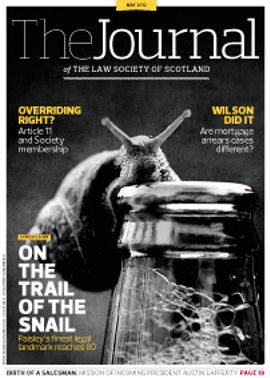Prepare for case management

In Cooper v Merck Sharp and Dohme Ltd [2012] CSOH 48 (13 March 2012), an action based on alleged defects in a prescription drug, Lord Brailsford was moved to discharge a proof assigned for 48 days.
The reasons for his refusal are largely case specific. At various by order callings there had been no indication of problems. A subsequent motion to discharge had been refused because there was still sufficient time for expert evidence to become available. The reason for the present motion was that expert evidence would not be available in time; it was unsatisfactory for such litigation to be instigated without supportive expert evidence. It was further unsatisfactory to give the impression that all was in place for a proof when this was not the case.
Lord Brailsford made some general observations regarding case management. It was required to ensure the efficient use of public funds by courts taking control of litigation. Effective case management further allowed parties to address the issues which genuinely arose in the litigation in an effective and ordered manner. Properly used, case management should be in the interests of justice by allowing disputes to be resolved more efficiently, as compared with parties being free to indulge in tactics which might be more concerned with their own interests.
It seems to me that these observations are very pertinent in light of the likely implementation of much of the Gill Review. In short, a greater emphasis on case management seems inevitable. This will place burdens on both advisers and the judiciary. There will be a need for greater preparation and time will have to be set aside for that. I have some doubts that this is recognised at present.
Vexations litigants
In Lord Advocate v AB [2012] CSIH 31 (27 March 2012) Lady Paton indicated that for a litigant to be determined vexatious it had to be established that he was habitually and persistently instituting proceedings without any reasonable ground. Further consideration had to be given to the whole circumstances of the litigations. The purpose of a determination was to protect parties who might be called as parties, and the resources of the judicial system from being squandered. The order was granted in the circumstances.
Party litigants
Party litigants appear increasingly common in litigation generally. The consumer lobby perhaps should, however, bear in mind observations by Sheriff Mundy in Northern Hydroseeding Ltd v McDonald, Alloa Sheriff Court, 28 February 2012 that such litigants place themselves at a considerable disadvantage in presenting their case. They also cause problems for the court and the opponent. There are limits beyond which a presiding judge cannot go. I would venture that at proof the judge’s role is to explain to a party litigant the procedure and what will happen; it is not to assist them present their case.
Recall of interim orders
Kipling v Dunbar Bank plc [2012] CSOH 40; 2012 GWD 12-223 concerned a petition for suspension and interdict of a charge. Interim orders had been granted. Two of the grounds on which the petition was based were then deleted by amendment. Recall of the interim orders was sought on the basis, first, that it was now clear that there had not been full and frank disclosure of all material matters. Further, there was now no sufficient prima facie case. Failing recall, the petitioner should be required to find caution.
Lord Drummond Young said five factors were pertinent. First, the decision on the interim orders was not conclusive of the dispute. Secondly, the orders were only temporary pending final determination. Thirdly, the balance of convenience required to be considered, which necessarily involved the issue of prejudice to the respective parties. Fourthly, the relative strengths of the parties’ positions on record and in submission were important. Finally, the relative strength had to be weighed against the issue of prejudice. If the likely prejudice visited on a party if the order was not in place was manifest and serious, an interim order might be justified although the legal and factual case was meagre. In the circumstances, recall was refused, as was an order for caution. Caution was no longer a precondition of an order for interim suspension and it was solely a matter of judicial discretion. Lord Drummond Young also indicated that the changes to the petitioners’ averments were not so extreme as to justify a recall on that basis alone. Such applications were of necessity drawn up as a matter of urgency. (See also the online article, April 2012, at bit.ly/HmrQZ2 – Editor)
Appeals
In Percy v Govan Initiative Ltd [2012] CSIH 22 (13 March 2012) Lady Paton made certain observations regarding the requirements of a note of appeal, in particular the grounds of appeal. In terms of the relevant rule, these had to consist of brief specific propositions stating the grounds on which the appeal should be allowed. They had to address where the court below went wrong. Grounds of appeal were a step in process and were not to be regarded as a mere formality. The purpose was to give the respondent and the appeal court notice as to the basis on which the appeal was to be argued, and to enable parties to direct their arguments, and their preparation, to the points truly at issue.
Expenses
A motion to modify expenses after a tender had been accepted was argued in McDonald v Zurich Insurance Co (UK) Ltd [2012] CSOH 65 (18 April 2012), an action for recovery of credit hire agreement costs. The tender was just above the privative limit of the sheriff court and the defenders sought to modify expenses to the sheriff court ordinary scale without sanction for counsel. Lord Bannatyne agreed to so modify the award. The choice of forum had to be determined in light of all the circumstances known by the pursuer’s advisers when the action was raised, having regard to the high level of costs incurred in the Court of Session. The limited value of an action did not mean that the Court of Session was inappropriate if it raised a novel or complex legal issue. No such issue existed in the present instance.
An award of expenses to the pursuer was appealed in Campbell v Gallagher, Dumfries Sheriff Court, 13 March 2012, a personal injury claim. An offer to settle had been made pre-litigation. At that stage the pursuer was awaiting further medical reports. Almost two years later, after an action was raised, a tender for the same figure was accepted. Sheriff Principal Lockhart considered that it had been impossible for the pursuer’s agents to advise on the basis of the first medical report, obtained shortly after the initial offer. Conclusive medical opinion was not received until after the action was raised to preserve the triennium. The sheriff principal observed that it would have been open to the defenders to move to sist the action after it was raised to minimise expense. The pursuer had acted reasonably and was entitled to expenses.
In S v S, Livingston Sheriff Court, 15 March 2012 Sheriff Kinloch considered issues of the parties’ success, offers made to settle the various financial claims, co-operation such as disclosure between the parties on the issues, and the orders regarding the parties’ children in finding no expenses due to or by either party. In Grafton Merchanting v Manson, Lerwick Sheriff Court, 20 February 2012 Sheriff Mann refused a motion for expenses on the scale appropriate to agent and client, client paying, for the period following the discharge of a diet of debate, on the basis of the defence being completely changed. It had been submitted that the defender had conducted the litigation so far incompetently and unreasonably. Sheriff Mann considered that he could not reach such a conclusion. Perhaps the pursuers would have had more success if they had moved for an award of the expenses to date.
Actions for recovery heritage
In City of Edinburgh Council v Burnett, Edinburgh Sheriff Court, 14 March 2012, Sheriff Principal Stephen determined that it was competent to combine a crave for recovery of possession of a short Scottish secured tenancy with one for payment of a sum in excess of £5,000. The sheriff principal considered the effect of s 36 of the Housing (Scotland) Act 2001 and s 35 of the Sheriff Courts (Scotland) Act 1971, to be that a crave for recovery and a crave for payment of a sum in excess of the summary cause limit could appropriately be combined in an ordinary action. While there were merits by way of expense, and the requirement for a hearing, under summary cause procedure, a hearing could be obtained in an ordinary action by lodging a notice of intention to defend. Multiple actions should be avoided as they resulted in additional cost and procedure.
In Northern Rock (Asset Management) plc v Millar; Royal Bank of Scotland plc v McConnell, Glasgow Sheriff Court, 28 February 2012, Sheriff Deutsch determined an issue regarding preliminary procedure in actions for recovery of heritable property in which the pursuers as heritable creditors relied on the terms of s 5 of the Heritable Securities (Scotland) Act 1894 and s 24 of the Conveyancing and Feudal Reform (Scotland) Act 1970. In the action based on s 5, reliance was placed on the expiry of a calling-up notice. Sheriff Deutsch held that the pre-action requirement to provide information to the debtor defender required to occur after the calling-up notice expired. This applied with equal force in respect of the action founded on s 24 of the 1970 Act.
Family actions
In AB v CD, Airdrie Sheriff Court, 22 March 2012, Sheriff Principal Lockhart upheld the sheriff’s decision to dispose of a minute to vary a prior interlocutor relating to a child of 12, without hearing evidence. The defender had been less than diligent in pursuing his claim in the minute and the views of the child were against the order sought. The sheriff principal observed that the defender had shown a total disregard for the child’s welfare. The only problem was that the decision was made at a procedural hearing as opposed to a child welfare hearing, and it might be argued that there was no power available to the sheriff. The sheriff principal took a practical view and refused the appeal.
Interestingly, he referred to chapter 14 of the Ordinary Cause Rules, relating to minutes, and considered that rule 14.11(2) did not require evidence to be heard to dispose of a minute. Whilst that may be correct in general, the procedural history in this minute indicated that there had already been two proofs of the minute assigned.
Update
Since the last article Farstad Supply v Enviroco Ltd (November 2011 article) has been reported at 2012 SLT 348, and Royal Bank of Scotland plc v Matheson (also November) at 2012 SCLR 76.
In this issue
- Arguments in store
- Farming the constitution
- Willing to wound, yet afraid to strike?
- Deferred consideration – worth the paper?
- OSCR: the secondees' perspective
- To efficiency and beyond
- Reading for pleasure
- Opinion column: Fraser Tait
- Council profile
- Book reviews
- President's column
- Wind farms: a challenge to registration
- Snail of the century
- Rights both ways
- Sell, sell, sell
- RBS v Wilson: light in the tunnel?
- Take the heat out
- Prepare for case management
- Looking into the past
- Migrant days numbered
- CPI - the story so far
- Brighton declares
- Mary Mary quite contrary?
- How to avoid that Guarantee Fund interview, and worse...
- Law reform roundup
- Apportionment of price for SDLT
- Business checklist
- Practical guide to legal risks
- Ask Ash






